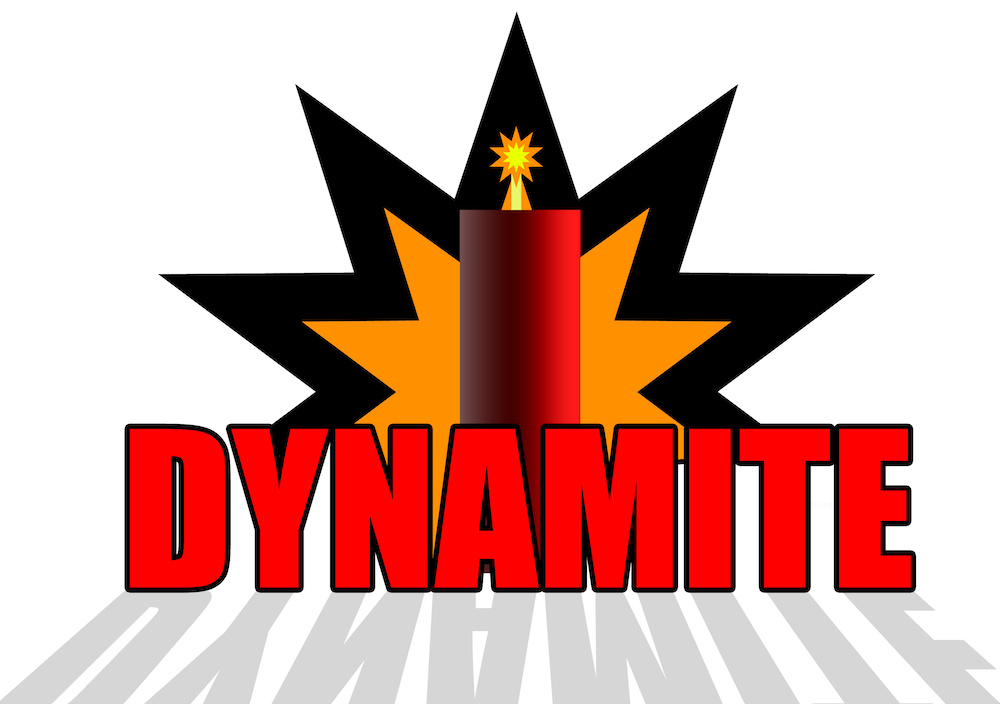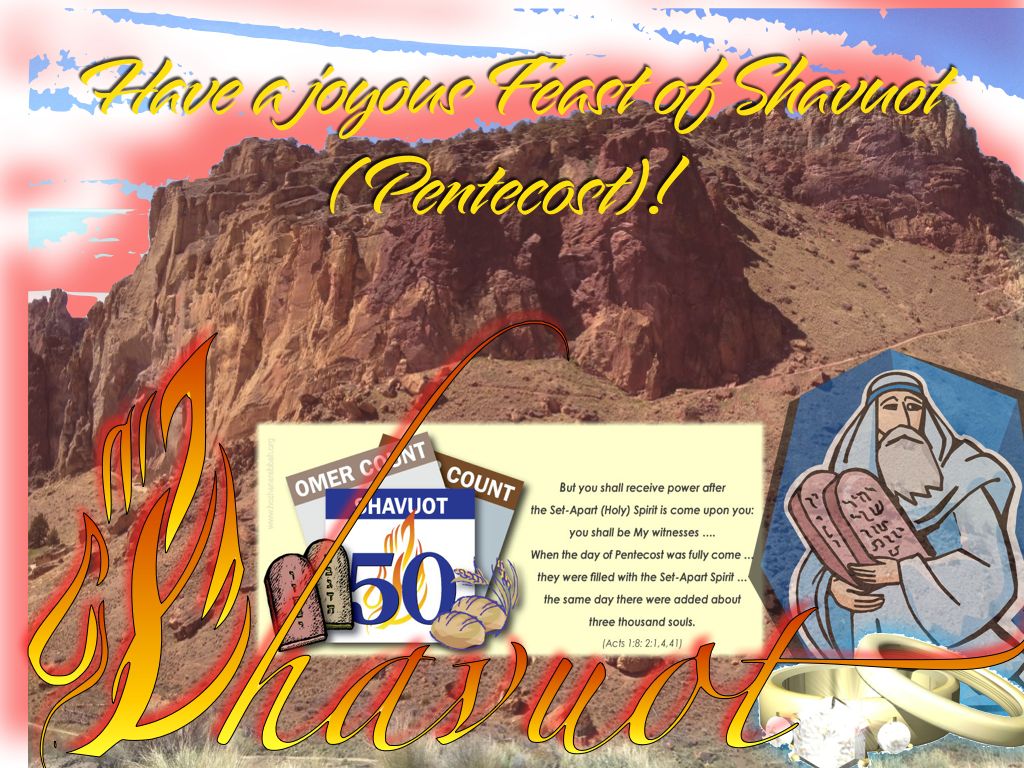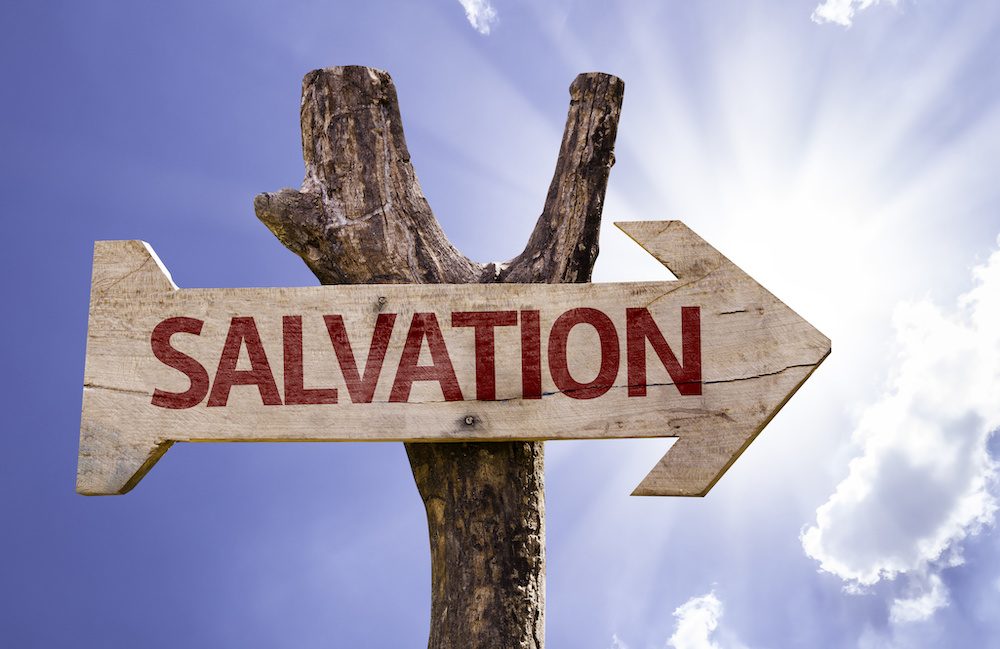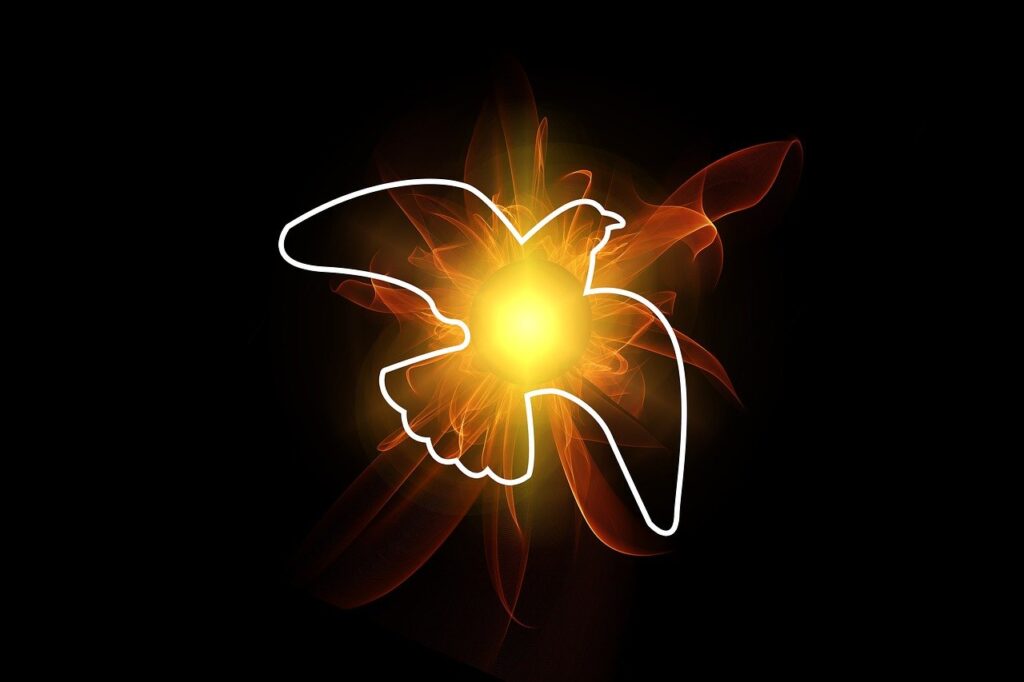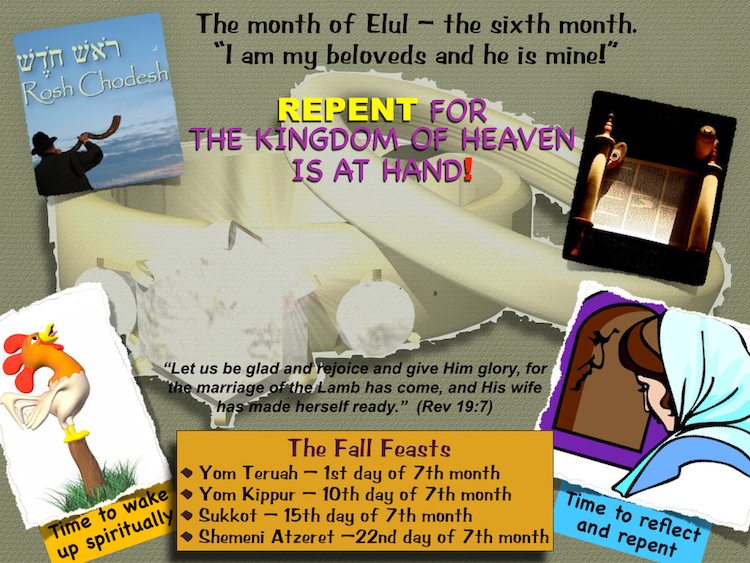
Elul is the traditional Jewish name for the sixth month of the biblical year and is the lead-up to the seventh month when the final four of the seven biblical fall festivals occur. Elul is an acronym for the Hebrew phrase found in Song of Songs (also known as the Song of Solomon or Canticles) chapter six verse three:
I am my beloved’s, and my beloved is mine…
What, you may ask, does the Song of Songs—a romantic, at times even erotic, lyrical love poem have to do with the fall biblical feasts that prophetically picture the second coming of Yeshua the Messiah? Glad you asked!
As children of the light, we are called to NOT be ignorant of the times or seasons (1 Thess 5:1–11). This includes understanding the biblical feasts which occur “at their appointed time” (Lev 23:4, NKJV) or “in their season” (Lev 23:4 KJV) and are prophetic of and chronological in the steps YHVH’s glorious plan salvation for humankind.
But of the times and the seasons, brethren, ye have no need that I write unto you. For yourselves know perfectly that the day of the Lord so cometh as a thief in the night. For when they shall say, Peace and safety; then sudden destruction cometh upon them, as travail upon a woman with child; and they shall not escape. But ye, brethren, are not in darkness, that that day should overtake you as a thief. Ye are all the children of light, and the children of the day: we are not of the night, nor of darkness. Therefore let us not sleep, as do others; but let us watch and be sober. For they that sleep sleep in the night; and they that be drunken are drunken in the night. But let us, who are of the day, be sober, putting on the breastplate of faith and love; and for an helmet, the hope of salvation. For Elohim hath not appointed us to wrath, but to obtain salvation by our Lord Yeshua the Messiah, Who died for us, that, whether we wake or sleep, we should live together with him. Wherefore comfort yourselves together, and edify one another, even as also ye do. (1 Thess 5:1–11)
The autumn feasts speak of events surround the second coming of Yeshua the Messiah. Contrary to biblical Truth, the mainstream Christian church has lied to its people by declaring that Elohim’s Torah-law including the seven biblical feasts have been fulfilled (i.e., done away with) and are no longer relevant to the saint. This is patently absurd, especially when it comes to the fall feasts, since they obviously have not been fulfilled. This is because the prophetic events to which they point HAVE NOT yet occurred. Yeshua has not returned yet, the resurrection and glorification of the saints has not occurred, and Yeshua has not been reigning with a rod of iron on this earth from his seat of power in Jerusalem for a thousand years with peace on earth and good will toward men.
So yes, the YHVH’s feasts are still important in the life of the Bible believing saint and, therefore, it is important that we not only be aware of them, but that we prepare to celebrate them. As such, the sixth month (the month of Elul) on the biblical calendar is the time to prepare for the fall feasts that occur in the seventh month which are the Day of Trumpets (Yom Teruah, the Day of Atonement (Yom haKippurim), the Feast of Tabernacles (Chag haSukkot) and the Eighth Day (Shemini Atzeret). This is the time when the bride (those saints of Yeshua who have met the qualifications for this high-level reward) are to prepare themselves for their coming bridegroom (Yeshua the Messiah). How do they prepare? By cleansing their lives of sin and putting on the robes of righteousness. This occurs through acknowledging, confessing and repenting of sin (i.e., the violation of YHVH’s Torah-commandments; 1 John 3:4; 1:8–9; 2:3–6; John 14:15, 21; Rev 12:17; 14:12; 19:7–9; 22:14), and then turning from sin and loving YHVH by obeying his Word from Genesis to Revelation . The month of Elul is the time for each person to take stock of his or her life, to critically evaluate oneself and then to make improvements with the help of the Bible, Yeshua the Messiah and the Spirit of Elohim to guide and empower us in the process.
May Yeshua’s Parable of the Ten Virgins in Matthew 25 be a warning to us about the importance of preparing ourselves for Yeshua’s return. Although most Christians are aware of Yeshua’s return, some people take preparing more seriously than others. The attitude of many people is that of complacency and prideful self-sufficiency as expressed by Peter.
That ye may be mindful of the words which were spoken before by the holy prophets, and of the commandment of us the apostles of the Lord and Saviour: Knowing this first, that there shall come in the last days scoffers, walking after their own lusts, and saying, Where is the promise of his coming? for since the fathers fell asleep, all things continue as they were from the beginning of the creation. For this they willingly are ignorant of, that by the word of Elohim the heavens were of old, and the earth standing out of the water and in the water: Whereby the world that then was, being overflowed with water, perished: But the heavens and the earth, which are now, by the same word are kept in store, reserved unto fire against the day of judgment and perdition of ungodly men. But, beloved, be not ignorant of this one thing, that one day is with the Lord as a thousand years, and a thousand years as one day. The Lord is not slack concerning his promise, as some men count slackness; but is longsuffering to us-ward, not willing that any should perish, but that all should come to repentance. But the day of the Lord will come as a thief in the night; in the which the heavens shall pass away with a great noise, and the elements shall melt with fervent heat, the earth also and the works that are therein shall be burned up. Seeing then that all these things shall be dissolved, what manner of persons ought ye to be in all holy conversation and godliness, Looking for and hasting unto the coming of the day of Elohim, wherein the heavens being on fire shall be dissolved, and the elements shall melt with fervent heat? Nevertheless we, according to his promise, look for new heavens and a new earth, wherein dwelleth righteousness. Wherefore, beloved, seeing that ye look for such things, be diligent that ye may be found of him in peace, without spot, and blameless. (2 Pet 3:2–15)
Let us also heed Yeshua’s warning to the lukewarm saints in Laodicea.
And unto the angel of the church of the Laodiceans write; These things saith the Amen, the faithful and true witness, the beginning of the creation of Elohim; I know thy works, that thou art neither cold nor hot: I would thou wert cold or hot. So then because thou art lukewarm, and neither cold nor hot, I will spue thee out of my mouth. Because thou sayest, I am rich, and increased with goods, and have need of nothing; and knowest not that thou art wretched, and miserable, and poor, and blind, and naked: I counsel thee to buy of me gold tried in the fire, that thou mayest be rich; and white raiment, that thou mayest be clothed, and that the shame of thy nakedness do not appear; and anoint thine eyes with eyesalve, that thou mayest see. As many as I love, I rebuke and chasten: be zealous therefore, and repent. Behold, I stand at the door, and knock: if any man hear my voice, and open the door, I will come in to him, and will sup with him, and he with me. To him that overcometh will I grant to sit with me in my throne, even as I also overcame, and am set down with my Father in his throne. He that hath an ear, let him hear what the Spirit saith unto the churches. (Rev 3:14–22)
At the same time, may we be encouraged by Yeshua words to the faithful saints in Philadelphia.
And to the angel of the church in Philadelphia write; These things saith he that is holy, he that is true, he that hath the key of David, he that openeth, and no man shutteth; and shutteth, and no man openeth; I know thy works: behold, I have set before thee an open door, and no man can shut it: for thou hast a little strength, and hast kept my word, and hast not denied my name. Behold, I will make them of the synagogue of Satan, which say they are Jews, and are not, but do lie; behold, I will make them to come and worship before thy feet, and to know that I have loved thee. Because thou hast kept the word of my patience, I also will keep thee from the hour of temptation, which shall come upon all the world, to try them that dwell upon the earth. Behold, I come quickly: hold that fast which thou hast, that no man take thy crown. Him that overcometh will I make a pillar in the temple of my Elohim, and he shall go no more out: and I will write upon him the name of my Elohim, and the name of the city of my Elohim, which is new Jerusalem, which cometh down out of heaven from my Elohim: and I will write upon him my new name. He that hath an ear, let him hear what the Spirit saith unto the churches.


